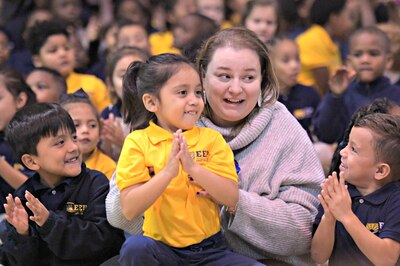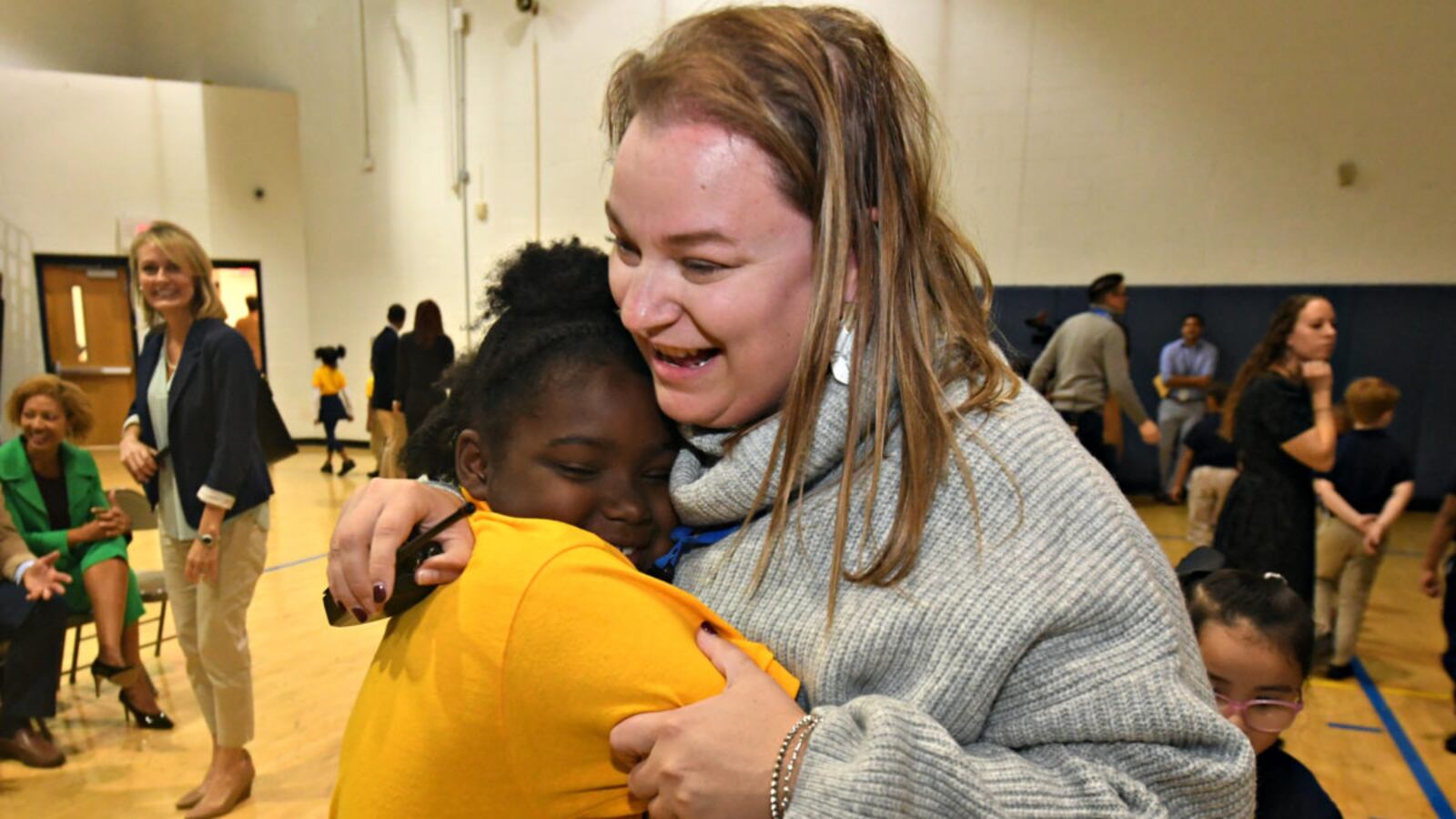Here, in a feature we call How I Teach, we ask educators who’ve been recognized for their work how they approach their jobs. You can see other pieces in the series here.
A Nashville kindergarten teacher who won the “Oscars” of education this school year says she really needs more of one thing as an educator.
Time.
“I struggle with how in education, we are often looking for quick fixes to help drive student growth and achievement when in actuality, time is one of the biggest factors needed to see if certain changes work,” Shelly Gaughan said. “But I believe that time is one thing that most of us, despite where or what we teach, can agree [is] the one thing we need more of that no one can really give.”
Gaughan, who teaches at East End Prep charter school in Nashville Public Schools, was one of two Tennessee teachers honored in October with a Milken Educator Award from the Milken Family Foundation. The award includes a no-strings-attached check for $25,000.
With the time Gaughan does have with her students, she said works to help them understand their own emotions, the world around them, and how the two fit together.
This interview has been condensed and lightly edited.
Was there a moment when you decided to become a teacher?
Growing up, I initially didn’t think that I would get into education, despite my love of babysitting, tutoring, and camp counseling. My desire to teach stemmed from two different inspirations: an opportunity to try out different jobs during my senior year of high school and my mom. During my senior year in high school, all seniors are offered a week-long opportunity to try out a job they may be interested in. Initially, I was going to try a week at a local newspaper because I thought I might be interested in journalism. But at the encouragement of one of my teachers, I instead applied for a teaching opportunity. I was tasked with teaching ancient civilizations to a sixth-grade class and I loved it. I found myself intrigued with the challenge of making this content relevant and exciting for the class I was with and I appreciated the opportunity that my high school gave me to try out something before committing to a major that I would have had no exposure to upon my arrival at college.
My second inspiration was my mom. My mom has been a teacher for 17 years but it wasn’t her first career. Before my family’s move to Nashville, my mom was an X-ray technician in Chicago. She enjoyed her work, but didn’t necessarily think it was a passion. The move to Nashville encouraged my mom to find another job as a preschool teacher at a local church daycare. She then went on to find a job as a fourth-grade teacher in a Catholic school. Seeing how much my mom is motivated every day to provide her kids with meaningful learning activities has inspired me to challenge and push myself to be better each day. She is truly the best teacher I’ve ever known.
Tell us about a favorite lesson to teach. Where did the idea come from?
I have a few but if I had to narrow it down to two: Every morning, we start by either drawing from an experience or a problem we are noticing class-wide, like issues with tattling, making an apology, having a disagreement. Or we say a daily affirmation, such as: “I am a generous person: how can I show generosity today?” or “I can be brave: what’s one way I can show bravery at school?” I love how our day begins grounded in developing these necessary interpersonal skills, and I believe it’s also a healthy and happy way we can start the day together.
My other favorite units to teach are my writing units during Black History Month and Women’s Month. Each kindergarten class takes on learning about a famous African American during February and an influential woman in March. We do a nonfiction writing project, incorporating nonfiction read-alouds, video clips, and photos, gather facts, and then write and publish pieces of what the kids learned. The project culminates when we then get to make a project or craft in the style of that person. Last year, we did Jean-Michel Basquiat and Sacagawea. I’m excited to expand this project during Hispanic Heritage Month, exploring other cultures and people of influence.
What object would you be helpless without during the school day?
I love my ELMO document camera, which projects papers onto a screen. I love being able to project student work so kids can learn from one another. It has helped students take ownership of their work and how they can deliver it to their peers. I use it approximately one million times a day.
What’s something happening in the community that affects what goes on inside your class?
While my kiddos are still pretty small, I have found that they are very curious about the world around them, especially as it comes to safety within their communities or having [adults] take care of them. We do our best to help our kids know that in our classrooms they are safe, thought of, cared for, and loved beyond measure. We encourage them to ask questions and explore their emotions and we serve as loving and accepting “school mamas.”
Tell us about a memorable time — good or bad — when contact with a student’s family changed your perspective or approach.
I’ve had the pleasure of serving siblings from the same families over the years I’ve been at my current school. I’ve been to birthday parties, recitals, games, funerals, family parties … the list goes on. But I think one of the most memorable experiences I have had was this year when I now have kids in my class who I literally held as infants 5 years ago. I love how I have these relationships with our families that I can literally see their families grow and change in front of my eyes and I feel grateful being a part of them in the small way that I can be.
What part of your job is most difficult?

Time. So many aspects of time. I can struggle with my pacing, usually because I get so excited about exploring a topic, and I want all the time to have all students share ideas and thoughts. I can struggle with the amount that we are teaching and the actual number of days that we have to do it in. I struggle with how in education, we are often looking for quick fixes to help drive student growth and achievement when in actuality, time is one of the biggest factors needed to see if certain changes work. But I believe that time is one thing that most of us, despite where or what we teach, can agree [is] the one thing we need more of that no one can really give.
What was your biggest misconception that you initially brought to teaching?
The biggest misconception I had when I first got into teaching was that I could plan to the middle academically and reach all. I’ve seen how powerful differentiating materials, homework, and resources can be for giving students what they need and how their success directly correlates to that.
What are you reading for enjoyment?
I’m a pretty eclectic reader! I like to stay current and read professional journals and articles relating to education, but often, I like to practice what I preach about cultivating a life-long love of reading, and I try to prioritize that on my off-time. I am a big fiction reader, especially crime thrillers, historical or literary fiction, or a good rom-com! But the book club I’ve been a part of for about a year now does a really good job of challenging me to read outside of fiction and we have been reading more nonfiction. I’ve also made it a personal goal of mine to read at least one nonfiction and one classic a month in addition to a [contemporary] fiction book. On my nightstand for January is “Becoming” by Michelle Obama (amazing!) for nonfiction, “Breakfast of Champions” by Kurt Vonnegut for my classic, and “Still Lives” by Maria Hummel for my fiction.
What’s the best advice you’ve received about teaching?
“As soon as you are the most important person in the classroom, you should leave it.” Teaching is a profession of service and I cherish the gift that is my vocation to it. That piece of advice came from my mentor teacher during student teaching. She said that it was going to be a job that would try and wear you down, be it the emotional toll of service to our students or how there is a level of politics to teaching. She said that the way she combated that was she always kept her good humor and while what we do is such an important job, that we should not let it take away from how fun it can be. We are so lucky that we get to learn alongside our kids each day, to experience learning new content through fresh eyes and perspectives. I make it a point every day to prioritize my kids’ educational experiences and I want that to continue being the heartbeat of what I do.


